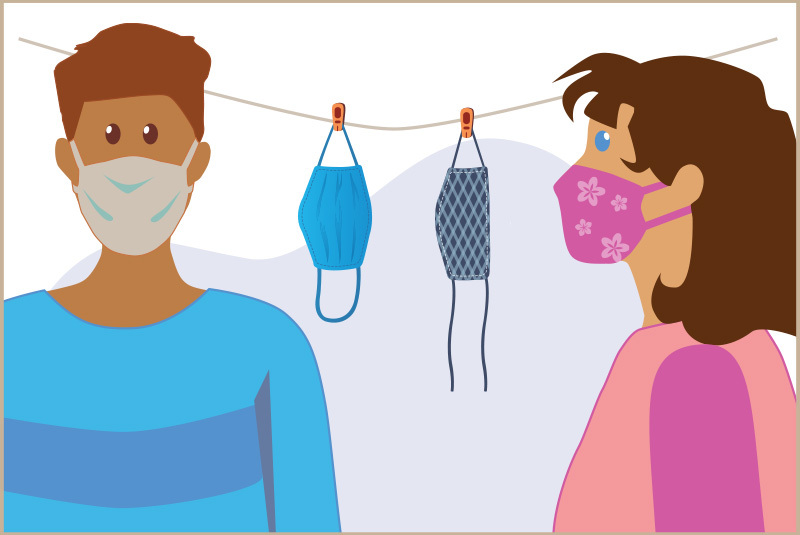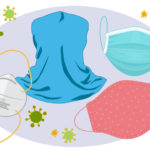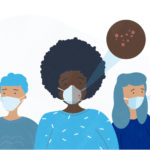Facing up to masks: Six reasons to stay the course

It’s now been almost a year since many businesses shuttered, schools closed, and Zoom calls became a way of life for many of us. Among the changes: face masks, designed to help prevent the spread the virus that causes COVID-19. If you’re experiencing so-called mask exhaustion, you’re not alone. One recent survey found that half of U.S. adults don’t wear masks when in close contact with people outside their household.
But there are very good reasons to keep up the practice of wearing one in public or when you’re within six feet of other people. In fact, here are six.
1. Masks are proven to work.
The science is clear: Masks are doing their job. One study found that face masks reduced the chances of COVID-19 infection by more than 80 percent. Another showed that even a crude cloth covering that is less than 100 percent protective against the virus could still significantly reduce the number of infections, and ultimately, the number of deaths.
2. Masks could help quash the pandemic.
New research from Boston Children’s chief innovation officer, John Brownstein, and his team suggests that a 10 percent increase in mask wearing could triple the odds that a community could control virus transmission. Simply by wearing a mask, you could help get the pandemic in check.
3. Masks could save lives.
Universal mask use — at least 95 percent of people wearing masks correctly and consistently in public — could prevent more deaths from COVID-19, according to another recent study. Researchers estimated that tens of thousands of lives could have been saved if Americans had achieved universal mask use between October 2020 and February 2021, for example.
4. Vaccines don’t eliminate the need for masks.
The new COVID-19 vaccines could have a major impact on the pandemic, but it will take time. What’s more, while both the Pfizer and Moderna vaccines have proven highly effective in protecting people from developing COVID-19, we don’t yet know if the vaccines make people less likely to transmit the virus to others.
5. Most kids aren’t eligible for the vaccines yet.
While the Pfizer vaccine can be given to people ages 16 years and older, most teens in that age bracket won’t receive it in the first several months of distribution unless they have underlying conditions. For younger teens and children, a vaccine could be months to a year away. Keep wearing a mask until everyone has a chance to be vaccinated.
6. Masks may prevent more than just COVID-19.
Masks aren’t just effective at helping prevent the spread of COVID-19. Research suggests that they could also help protect against other respiratory viruses, such as those that cause the common cold or flu. That’s why kids and adults with conditions that weaken the immune system have been wearing masks in public for years.
The science on masks is clear — but there’s one more reason to wear one. Doing so shows that you and your family care about other people’s health and well-being, too.
Masks 101
Need a refresher course in masks? We’ve got you covered.
The U.S. Centers for Disease Control and Prevention recommends that everyone over age 2 wear a cloth face covering when they have to go out in public.
– This cloth face covering is meant to protect other people, because you could spread COVID-19 to others even if you don’t have symptoms.
– Masks should cover your nose and mouth.
– They should be made of two or more layers of washable, breathable fabric.
– If you’re using disposable surgical ear loop masks, throw them away at the end of the day, or if they become wet. Cloth masks should be washed frequently.
– Children under age 2 and people who have trouble breathing shouldn’t wear cloth face masks.
– A mask is not a substitute for social distancing.
Get more answers about Boston Children’s response to COVID-19.
Related Posts :
-

How masks protect against COVID-19: Understanding the science
As the number of COVID-19 cases continue to rise in the U.S., including in children, wearing a face covering ...
-

Behind the mask: How to prevent and treat mask-related acne in children and teens
Wearing a mask is very effective at helping prevent the spread of COVID-19, but it can also trigger a host ...
-

How to encourage your child to wear a mask for COVID-19 protection
The U.S. Centers for Disease Control and Prevention recommends that everyone older than age 2 wear a face covering in ...
-

COVID-19 vaccines: Do you know myth from fact?
Two COVID-19 vaccines — from Pfizer/BioNTtech and Moderna — have received emergency use authorization in the United States by the ...





